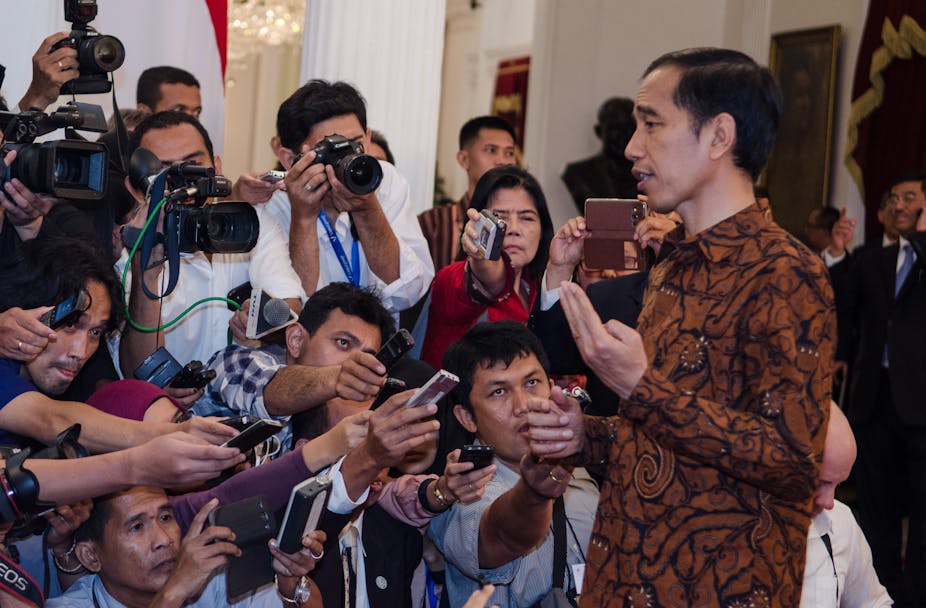A video and photo of President Joko “Jokowi” Widodo wearing a denim jacket and Vans Metallica sneakers on a gold-plated Chopper motorbike have created a stir on social media. A follow-up meme based on the photo, with the denim-clad Jokowi pictured as the lead character in popular teenage movie Dilan, has gone viral. The meme quotes the movie’s catchphrase with a bit of twist: “Don’t be a president. It is hard. Let Jokowi do it” along with a hashtag, #Jokowi2019.
It is not the first time Jokowi has won the hearts of people via social media. All his activities, including his signature blusukan (impromptu visits), are well captured in social media and receive good responses from the public. Updates on Jokowi’s official visits and his daily activities, from watching movies, going to musical concerts to spending time with his grandson, usually trend on social media.
A village boy, son of a carpenter in Solo, Central Java, Jokowi, who won the 2014 presidential election to become the first president with no military background, is eyeing a second term. Political communication experts see Jokowi’s stints on social media as a strategy to lure young voters in the 2019 presidential election.
Nyarwi Ahmad of Gadjah Mada University and Akhmad Danial of Syarif Hidayatullah Islamic State University agree that the displays of Jokowi’s mundane activities and trivial matters on social media are his attempt to create an image that keeps him relevant for young voters.
Millennials matter
The number of young voters in the upcoming election is expected to be significant.
In the previous election, people between the ages of 17 and 25 years old accounted for 30% of the voters. The General Elections Commission has estimated that the number of voters in the 2019 election will reach 196.5 million. Election survey agencies have estimated that the percentage of young voters will remain around 30% to 35%. This means the young voters will number between 60 and 70 million in 2019, including 7 million first-time voters.
Read more: Mapping the "political preferences" of Indonesia's youth
Based on that estimate, Nyarwi argues that winning young voters will be crucial for Jokowi to win the 2019 election, considering that he defeated his rival in 2014, Prabowo Subianto, by a small margin of around 9 million voters.
If Jokowi is able to secure 7 million votes from first-time voters, it will give him a good start for the upcoming duel with Prabowo, who has just announced his presidential candidacy for 2019.
However, recent surveys showed that Jokowi is less popular than Prabowo among young people and on social media.
“I guess his advisers have told him to do something about it,” Akhmad said. “Hence, his stunt with the big bike and everything on social media.”
Winning over the millennials, Jokowi’s way
Nyarwi said that young voters had different characteristics from the old ones and to win them over presidential candidates must know them. The incumbent had done his homework well on how to approach his potential voters, he added.
Jokowi’s campaign team is aware of young voters’ strong attachment to social media and knows how to take advantage of it. In addition to the president’s official Facebook and Twitter accounts, Jokowi even set up his own video blog (vlog), earning him a new title as the vlogging president.
“By appearing on social media, he wants to be as close as he can be with his potential voters,” Nyarwi said.
Millennials’ high scepticism of politics is another thing for the candidates to consider in creating a message for the young voters.
“You don’t want to sound preachy,” Nyarwi said, referring to the success of Jokowi’s current strategy to attract young people’s attention.
Jokowi was successful because he spoke the language of young voters, Nyarwi said. “No heavy content, just stress on the style.”
Such a strategy is evident in Jokowi’s trivial posts on social media, including his boxing exercise and his pets, which set millennials abuzz on the internet.
Jokowi’s rebranding strategies
Aside from being triggered by the practical need to target millennial voters, Akhmad argues that the change in Jokowi’s campaign strategy was driven by the need to stay relevant.
Jokowi’s old image that won him the presidency in 2014 is no longer suitable for next year’s election, according to Akhmad.
Jokowi won the people’s votes in 2014 by selling an image of a humble leader who wore cheap clothes and shoes, and spoke and acted like an average lower-middle-class Indonesian.
“But now that he is the president, those tricks will not work. With the power, money and 24-hour security guards, he is no longer our average guy,” Akhmad said.
Likening Jokowi to a brand, Akhmad said the president had conducted a rebranding strategy to win the election.
“He used to sell this image of a humble and down-to-earth figure. But now he is selling the image of young and energetic president,” he said.
Akhmad said Jokowi’s new image was built to gather the votes of the millennials, who have been described as the key group that will determine the winner of the 2019 election.
“Under such a strategy, I am sure that Jokowi’s campaign slogan will change from ”Jokowi adalah kita“ (Jokowi is us) to ”Jokowi, Gue Banget“ (Jokowi is so me),” he quipped.


